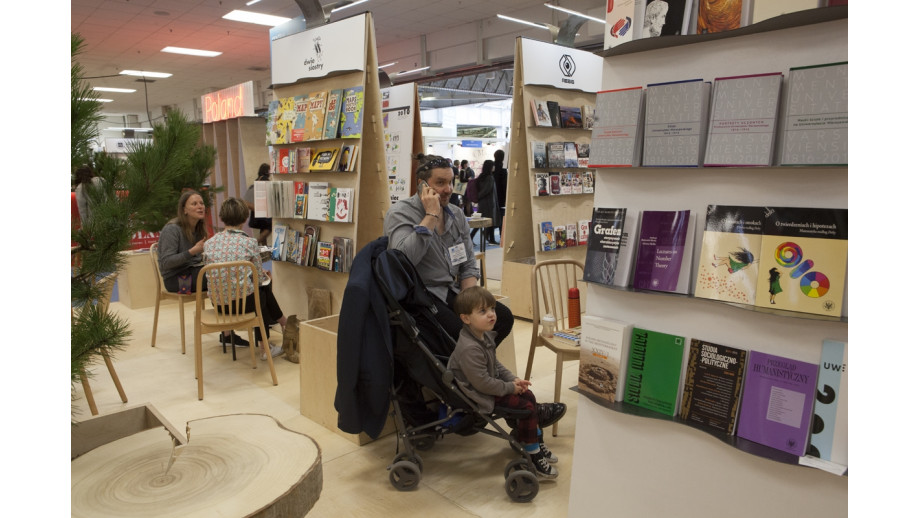News

Polish authors discussed the perception of Poland abroad, Polish culture from a woman’s perspective, the pitfalls of translating Joseph Conrad, and the art of drawing on Wednesday, the second day of the London Book Fair. Artur Domosławski, Dariusz Karłowicz, Professor Andrzej Nowak, Olga Tokarczuk, and Aleksandra and Daniel Mizieliński met with publishers and general audiences.
The day began with the good news of Wioletta Grzegorzewska’s nomination for the international Man Booker Prize for Swallowing Mercury, translated by Eliza Marciniak.
“We are absolutely delighted, particularly given that this is a debut for both the author and the translator," said Max Porter of Portobello Books, which published the English version.
“Everything about this book is interesting!" he enthused. “The universal experience of growing up, the abundance of a child’s imagination. Good prose impresses you whatever the language in which it was originally written. Our duty as publishers is to find the best artists and to present them to British readers – and they have been absolutely dazzled by Grzegorzewska’s novel," Porter added.
In the morning session Artur Domosławski spoke with English author and scriptwriter Hugh Thomson about the problems of Latin America. During the half-hour discussion in the chock-full booth of the English PEN Club, they spoke of the challenges encountered by reporters working in this part of the world.
At the same time, in the neighboring club space, Dariusz Karłowicz and Professor Andrzej Nowak spoke with Doug Wallace and editor-in-chief of The Calvert Journal, Ekow Eshun, about the Polish identity, and how the image of Poland and Poles is often distorted in the media literature.
“We want to present to the public, mainly in England, the Western media’s difficulties in imagining the situation in Poland – and more broadly speaking, Polish culture, identity, tradition, and the quarrels over its identity in the contemporary world. There are many misunderstandings here, many simplifications, many combinations of ignorance and arrogance – and this is what we tried to challenge in the discussion," said Professor Nowak.
“I believe that this was a truly fascinating discussion about the essence of the Polish identity and where it lies. For me, the most important thing is where Poland and its culture are heading. My experience with Poles – and there are a great many of them in Great Britain – is that they are exceedingly open, ready to change, and willing to work in a wider, more open world," Eshun explained. “That was the key question in our conversation: Is the Polish identity in the past, the present, or perhaps in the future?"
Essayist and philosopher Dariusz Karłowicz, in turn, said that Poland’s presence at the fair is part of a larger process of creating a narrative of Poland that is accepted in the West. “A story of Polish history is not only necessary for Polish culture, but for the Polish presence in the world as such, in an economic and political sense as well. Literature is a brilliant way of telling the story of our experiences, which are far from obvious for a Western European public, and this is an important step," he said.
In the lunch session, Olga Tokarczuk, Ewa Winnicka, and Marzanna Bogumiła Kielar spoke of what the female perspective brings to Polish culture, and how it differs from the male gaze. In the filled-to-capacity club hall they answered readers’ questions for over an hour, clarifying their motivations and explaining if gender is significant in their work.
At the same time, at the British Council translation booth, Stanley Bill, head of Polish studies at Cambridge University, spoke with Jacek Dukaj, Magdalena Heydel, and Catherine Anyango on the difficulties in translating Joseph Conrad.
“When I went to school in Australia, Conrad was in fact a bit daunting – he is a very difficult author, and his Heart of Darkness is beyond the average student. That book fascinated me, though I completely did not understand it. Only at university did I come back to it, understanding better what Conrad wanted to tell his readers, and I began to truly adore this text," Bill confessed.
“My students definitely know Conrad, but they always are enormously surprise when I mention he was a Pole," the academic noted, adding that the strength of Conrad’s work is its universality and modernity. “He described phenomena which remain with us, such as colonialism, which takes slightly different form than it once did; but rich countries continue to take advantage of poorer ones, in the form of international corporations, for instance," he said.
In the afternoon Artur Domosławski, Ewa Winnicka, and Remi Adekoya discussed the specifics of the Polish school of reportage and the Polish view of the world – both when it comes to Poles abroad (e.g. the Polish immigrants to Great Britain), and other nations.
Aleksandra and Daniel Mizieliński, in turn, met with readers of their bestselling Maps at the Polish booth, doing a live demonstration of their illustrators’ craft, creating large-format animal drawings.
“Our work is aimed at children, but we draw books that we would want to have ourselves. We treat children as people who are fully intellectually equipped, like adults who just have less knowledge," Daniel Mizieliński said.
“We always aim to create a good book. The stereotype that a picture book has to be for children is wrong. Graphics are just another language for communicating information," he added.
Olga Tokarczuk, who was presented on Wednesday as the “author of the day” for the whole London Book Fair, talked about her work with Rosie Goldsmith.
Ewa Winnicka spoke with Mae O'Hagan about the experiences of a million Poles living in Great Britain.
Today’s discussions will include Marzanna Bogumiła Kielar, Jacek Dehnel, and Jacek Dukaj, while Marta Ignerska and Ginny Skinner will take part in a drawing slam at Yurt Cafe in East London.
Check out the photo report of the London Fair here.